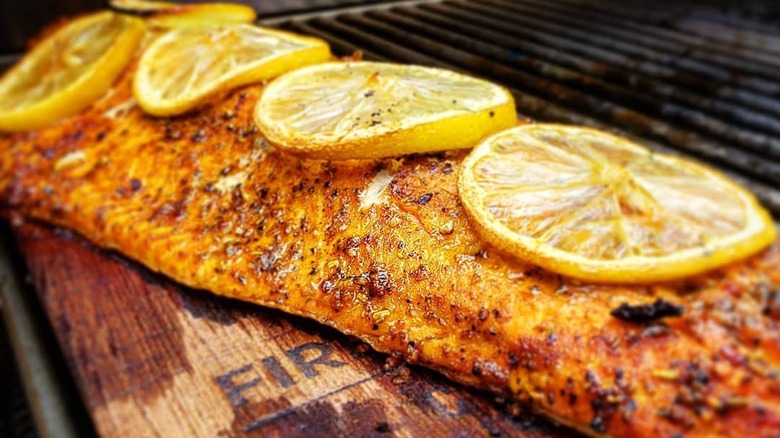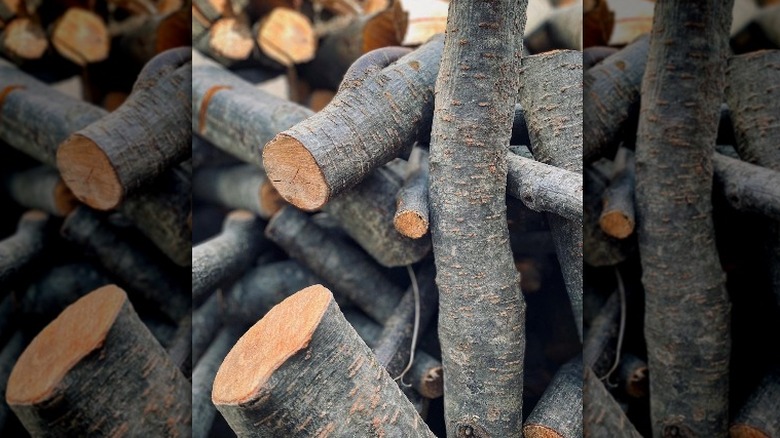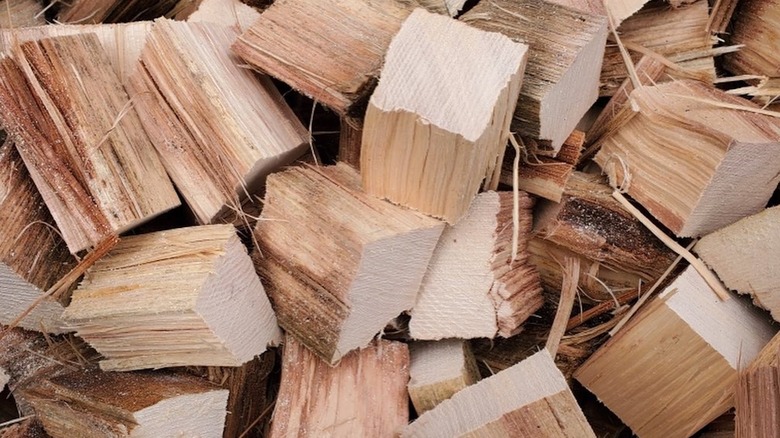Use This Wood For Grilling Flavorful Seafood
Few things ignite the appetite like the smoky aroma of barbecue cooking on the grill. Whether you're a fan of gas, charcoal, or wood as a heat source, grilling adds a depth of flavor to everything from meat to fruit. The choice of heat source is merely the beginning of your journey to flavor town, and selecting the right grilling wood can add a smoky taste that will take your barbecued foods to the next level (per Smoked BBQ Source).
Grilling with different woods elevates a food's natural flavor profile by bringing about 100 different compounds to the BBQ, according to Smoked Barbecue Source. These compounds can be gasses, solids, liquids, or oils that impart signature elements when added to the grill. Syringol and guiacol are two gases released from burning wood that create hunger-inducing smoky aromas and unmistakable campfire flavor that enhances grilled fare.
According to Martha Stewart, 13 wood varieties are preferred for grilling. Choosing a complimentary grilling wood depends on flavor preference, what you're cooking, and the ideal method, as each wood type performs differently and imparts a different aroma and flavor.
Alder wood is ideal for grilled seafood
Where there's smoke, there's flavor. Just as one would consider the right wine to compliment a meal, different smoke woods pair better with certain grilled foods. The right amount of smoky flavor can make or break your meal, and Masterclass suggests pairing hearty foods with robust woods and reserving subtly sweet smoke for more delicate dishes.
Mesquite, Oak, and Hickory wood conjure mouth-watering images of Texas-style BBQ because they are responsible for the intensely smoky and complex flavor layers in every bite of barbecued brisket you can savor. Their billowing smoke and strong flavors are great for thick cuts of meat that need to cook for hours. Their counterparts are fruit, maple, and pecan woods that burn a bit faster and have a mildly sweet flavor that tastes great on lighter proteins.
Hailing from the Pacific Northwest, alder wood is a more delicate variety that produces subtly sweet smoke that enhances the flavor of poultry, pork, and especially seafood (per Recipe Tips). It's no coincidence that alder wood is widely used in a region known for its delicious smoked salmon. Planks are often made from alder, as it smokes quickly and provides a hint of smoke that won't overwhelm a delicate fish filet. The sweet, gentle smoky notes of alder wood in your grill will yield flavorful smoked seafood every time.
Form matters
Different wood varieties lend their unique flavor profile to barbecued fare and Fix notes that the cut of wood is just as important when attempting to achieve smoky perfection. Choosing the form of smoking wood that works with what you're grilling can make a real difference in the finished product.
Woods for the grill generally come in planks, chunks, or chips, with chunks being the optimal form for a good long smoke session. Chunks don't require overnight soaking before being fired up, and they burn slowly, allowing the grill master to keep the lid down to cook a bit faster and impart a more intense smoky flavor. Chips are widely available but burn much faster than chunks, and while grillers have their own opinions on whether or not to soak chips in water, they need to be partially protected from the flames to keep them from becoming quick tinder. Chips can be placed in a ventilated foil ball to make them smoke a bit longer.
Planks are ideal for smoking quick-cooking fare like seafood or thinly sliced meats. They need to be soaked for an hour before grilling and need a quick kiss of heat to release excess moisture before having protein or vegetables placed on them for cooking. It takes a hot minute on the grill before they begin to smoke, so factor that into your cooking time.


